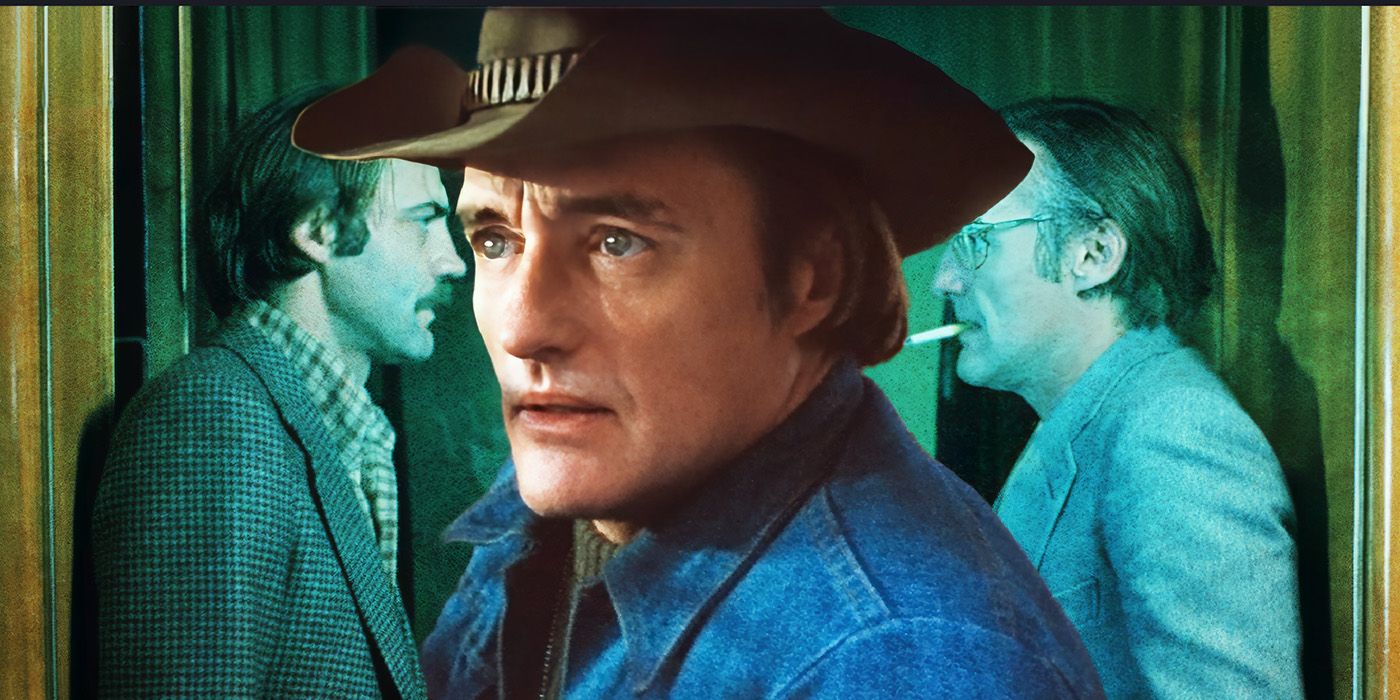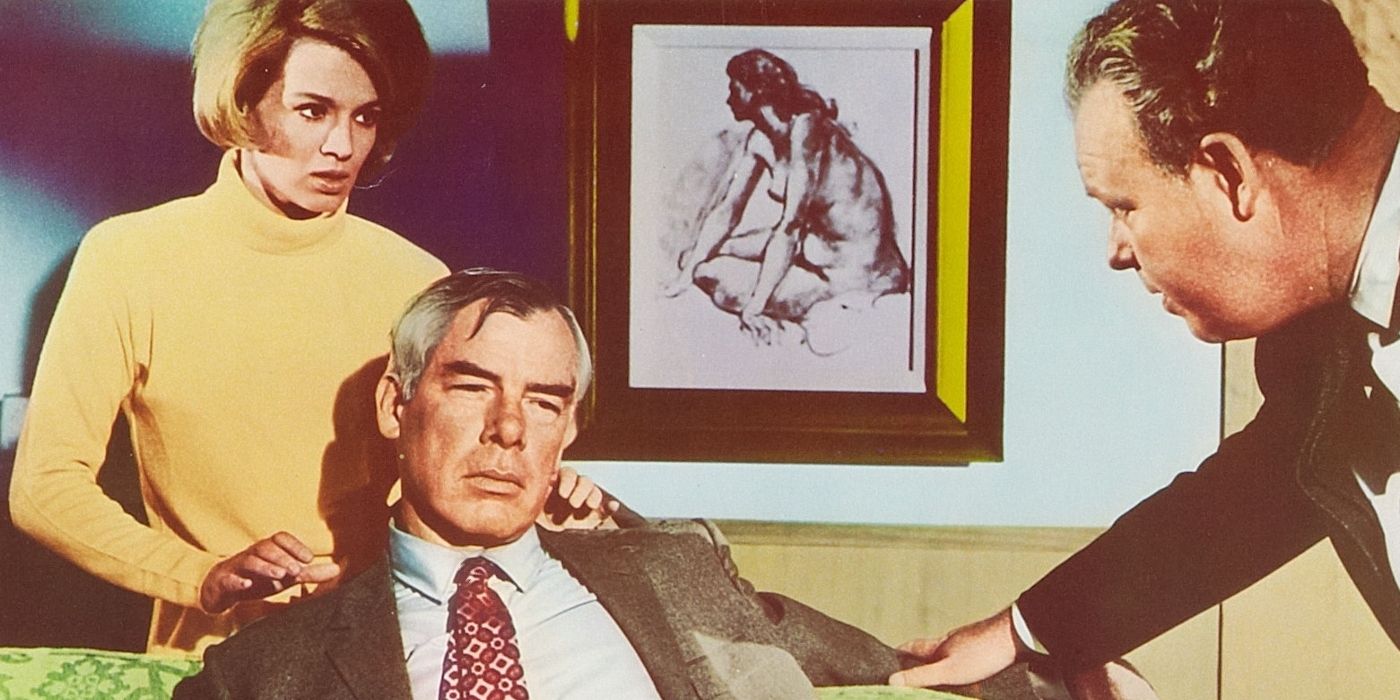The Big Picture
- Lee Marvin’s portrayal of Walker in
Point Blank
embodies ruthless determination and understated intimidation. - The film’s editing style and unique character dynamics create an otherworldly quality, fueling speculation about Walker being a ghost.
-
Point Blank
‘s influence on crime film history is evident, with future filmmakers borrowing elements from John Boorman’s direction and Marvin’s iconic performance.
Who doesn’t love a good revenge story? I’m not talking about stories about how revenge is a hollow mission that only destroys the souls of all involved, but the ones where the revenge was totally worth it! Where you watch your hero chase after retribution and think to yourself “damn right they deserve that.” Admittedly, those sorts of films aren’t so common, perhaps for fear of sending a bad message, but when we do get them, they’re so satisfying. In that vein, few films can match the efficient fury of Point Blank, a finely aged snapshot of the 1960s with a legacy far beyond its pulp roots. Lee Marvin gives one of his most iconic performances in a role perfectly suited to his dry ice sensibilities, giving us a man so fueled by his righteous anger that not even the possibility of death can stop him.
Point Blank (1967)
- Release Date
- August 30, 1967
- Director
- John Boorman
- Cast
- Lee Marvin , Angie Dickinson , Keenan Wynn , Carroll O’Connor , Lloyd Bochner
- Runtime
- 92 Minutes
‘Point Blank’s Lee Marvin Is the Ultimate Man-on-a-Mission
Walker (Marvin) just wants his $93,000 back, and he’ll do whatever it takes to get that money. After a routine robbery goes wrong, he gets shot and left for dead by his partner-in-crime, Mal (John Vernon). But that can’t stop Walker, as he picks himself up and heads out to get what’s rightfully his (kind of… he did steal it, after all). This will send him on a collision course with the likes of a shady crime syndicate called the Organization as well as Lynne (Sharon Acker), his wife who ditched him for Mal, and Chris (Angie Dickinson), his sister-in-law with whom Walker may have some unexpected business. The plot is fairly straightforward, if not threadbare. (Essentially the stuff that video game stories are made out of.) What grants the film its special position in the annals of cinema is John Boorman‘s direction, combining the classically foreboding construction of noir with an innovative editing style cribbed from the French New Wave influence of films like Breathless. That, and of course, Lee Marvin.
Walker is actually a character that audiences are more familiar with than you’d initially think. He’s based on a character named Parker, from a series of novels written by Donald Westlake, who allegedly stipulated that he wouldn’t allow filmmakers to use the name “Parker” unless they committed to making a full series of films. That’s why most filmed versions of Parker have different names, most notably with Payback having Mel Gibson‘s interpretation be named “Porter,” despite being the exact same storyline as Point Blank. Parker, as a character, is defined by his no-nonsense approach to getting the job done, only using violence as a tool when necessary, and having a ruthless focus on his main objective. In that vein, Lee Marvin is the perfect portrayal of “Parker,” carrying around all of his rage and indignation underneath a demeanor that’s shark-like in his casual command of space. Walker gives away nothing, even to the few people he knows on an intimate level, unless he absolutely has to, and Marvin is the eye of a tornado that swiftly tears through all who stand in its way.
Lee Marvin’s Walker Doesn’t Have To Try Hard To Be Intimidating
Walker really doesn’t give a damn about anything that isn’t his money. He’s also not exactly eager, but is still open to throwing himself into life’s cross-hairs at a moment’s notice. He’ll crash a car with him driving it to interrogate someone, he’ll quietly watch while someone else gets shot by the cops, and he’ll threaten a secretary in broad daylight just by whispering in her ear. Walker knows that he doesn’t need to exert much force on others because he’s already prepared with an attack plan and isn’t actually looking to truly hurt others. There’s no point in roughing people up if he doesn’t need to, and he can even be courteous to those he does inconvenience, such as when, after tying up two guys as part of a plan to infiltrate a building, he thanks them for their patience once he leaves them behind.
Walker constantly walks a line between being an outright sociopath and being a gentleman thief in the tradition of a less charming Danny Ocean, coexisting as the two extremes of a man who has boiled every aspect of his modus operandi down to a science. The magic of Marvin’s performance lies in how he’s so indomitably cool without ever being truly likable. Sometimes, we forgive a character for being mean and remorseless as long as they’re honest and exceptional at their job, and Walker is the very best.
He’s so clearly the best that just the sound of his shoes communicates how dangerous he is, as shown in an early scene where he’s walking alone through an airport hallway. The clacking of his heels on the polished tile reverberates so loudly through the space that, when we cut to his wife waking up in bed, we still hear the sounds of the shoes. It creates the impression that she somehow was woken up by the heels-clacking, like the romantic past she abandoned is haunting her even in her safest private moments. With the scene cutting back and forth between Walker walking and Lynne getting ready for her morning, it makes Walker a gray ghost briskly stalking his way back to reclaim his stake in life. This is an editing tactic that the film uses throughout, collapsing time between past and present, and is most effective in its evocation of Walker as someone unstuck in time. After surviving a betrayal, his righteous anger fueling his avenging angel status, Walker seems to experience all possible points in his timeline at once, and Marvin sells the mythical quality that the film bathes Walker in. It’s as if he’s literally come back from the dead, but that would be a crazy idea…or would it?
Is Lee Marvin’s Walker a Ghost in ‘Point Blank’?
It may be a bit gauche to claim any character that survives a gunshot is definitely actually a ghost, but Point Blank lays down so much overt text about Walker’s back-from-the-dead status that it’s led many critics to propose that Walker truly is a ghost for the majority of the film. Most notable of those critics was film historian David Thomson, who raised the idea that Walker “might be dead the whole time and just dreaming the stages of revenge. It was as if a film theorist had taken up a familiar noir story and redone it to address the rapture of fantasy we require in a movie.” John Boorman himself suggested “he could just as easily be a ghost or a shadow,” though when in a separate conversation with Steven Soderbergh about the film for the home media commentary, he shrugged off the idea entirely by saying “what it is, is what you see.” Not exactly the most ringing endorsement, and it’s difficult to know what Boorman’s true intentions were, seeing as the concept of a character being referred to as “back from the dead” after surviving a fatal attack isn’t that novel in a noir story.

Related
Dennis Hopper Put a Gritty Twist on Tom Ripley in This Neo-Noir
The New Hollywood rebel was an unexpected choice to play Patricia Highsmith’s career conman.
But let’s humor this idea for a moment. When Walker is shot in a jail cell and seemingly passes out, he wakes up in a completely different spot in the prison, which could be a continuity error, or could be his spirit leaving his dead body. When he tries to escape from Alcatraz Island, he initially attempts to (pathetically) swim away, but we instantly cut to him in a boat while wearing a snazzy suit, completely sidestepping a highly implausible escape plan. Most notable is the number of times people directly comment on Walker as if he were literally a ghost. Walker himself asks if his getting shot even happened or if it was a dream before passing out. When he confronts Lynne at her home, she admits that she dreams of how “good it must be being dead” and asks him if it’s true. When Walker re-encounters an old ally, he’s met with “Walker, are you still alive?” Finally, when Walker gives some of his money to Chris to help with her personal finances, she incredulously says “you sure died at Alcatraz,” implying the old Walker wouldn’t do that.
None of those are exactly smoking guns, and one must take Boorman’s dismissal into account. Either way, Point Blank is undeniably a film that left a huge impact on crime film history, with future filmmakers stealing liberally from Boorman’s and Marvin’s conception of this type of story. The best example of said influence was when Steven Soderbergh overtly stole from it in two different films. In Out of Sight, the way he edits the legendary sex scene between George Clooney and Jennifer Lopez cuts between them discussing the eventual sex over dinner and the deeply savory undressing they do beforehand, collapsing time similar to the montages of Point Blank. In The Limey, the entire film serves as a glorified and inspired remake, cribbing not just the style but the general plot outline and tapping into the allure of a tough guy whose anger propels him into the status of myth. But still, what those films are missing, and what makes Point Blank so special, is that otherworldly quality that Walker exudes, transforming a mean lone man into a harbinger of doom. The kind of harbinger that’s so threatening, so awesome in his force…that he may not even exist.
Point Blank is available to watch on Tubi in the U.S.
WATCH ON TUBI





